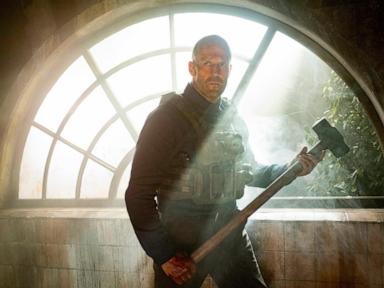NEW YORK — Larry Merchant often described boxing as “the theater of the unexpected.” When he was center stage, working with Jim Lampley and George Foreman on HBO Sports’ World Championship Boxing, the three voices presented their own version of the unanticipated.
Foreman, who died last week at the age of 76, joined HBO Sports in 1992. During the 12 years he worked with Lampley and Merchant, they evolved into the greatest three-man booth in the history of sports television.
For this is our undisputed truth: In all the years of eyeballing sports on television, there has never been a broadcast team we looked forward to watching as much as Lampley, Merchant and Foreman. No matter who was in the ring, HBO’s microphone trio, and their production team, were our main attraction.
Look, Lampley, Merchant and Foreman never purposely tried to upstage the action inside the ring. It all came naturally. They took the three-person configuration (usually an exercise in excess bloviating) and turned it into a unique production where originality blended with education, sincere emotion, sarcasm and verbal confrontation.
They layered in talk about the business of boxing, which HBO was neck-deep in. This provided “challenges” for the three voices. Still, they didn’t give much thought to what corporations, countries or promoters they offended.
And with Foreman being an active heavyweight, he didn’t have to say much to stir the pot with other stars of the heavyweight division. During the 1995 Evander Holyfield- Riddick Bowe fight, Foreman seriously questioned Holyfield’s health.
“This man is going to end up in a pine box,” Foreman said during the fight. “He’s got heart trouble.”
Bowe won by TKO. His manager, Rock Newman, was furious at Foreman for insinuating Bowe defeated a former champion who was damaged goods.
“He [Foreman] should be taken off the air,” Newman said. “Foreman will never work another pay-per-view fight that Bowe is involved in. … ”The only access Foreman can have to Bowe now is if he wants to fight him in the ring.”
By no means was Newman the only one to raise questions about Foreman merging his boxing comeback with his broadcasting duties. The perceived conflict also led to awkward, but entertaining, moments.
Like when Lampley or Merchant started asking “George” probing questions too close to his heavyweight business.
Foreman would pout. He would not respond. He would stonewall, going silent for a few rounds. Viewers became used to this. Behind the microphone, Foreman revealed contrasting sides of a personality of the man who already made his mark in the ring. A complex, spiritual giant who transcended sports and the boxing business.
On numerous occasions Merchant, who had his share of “enemies” outside the ring, delivered analysis that rankled Foreman. During a 2003 Oscar de la Hoya-(Sugar) Shane Mosley fight, Foreman dismissed one of Merchant’s snarky opinions by going pin-cushion on his partner, purposely belittling his boxing acumen, saying: “Larry, you don’t know boxing, you just watch boxing.”
At the next fight they worked, Foreman handed Merchant a note of apology. Not that Merchant was not appreciative, but he was surprised.
The last time Foreman thought he had hurt Merchant’s feelings, the big man gave the respected journalist an expensive watch. Yet, gifts were not the norm. The three announcers were able to quickly put hard feelings and harsh words behind them.
Nonetheless, the niceties would eventually wear off. The bickering was baked in. It just came naturally. No matter how schooled Merchant and Lampley were in the sweet science, Foreman believed he always knew more. Foreman was King of the Jockocracy.
During another Bowe fight, Merchant said: “We used to say he [Bowe] was the best schooled big man we ever saw ...




